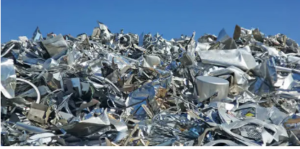One of the easiest and fastest ways to identify what kind of metal you are dealing with is by using a magnet to test its characteristics if it sticks firmly, that indicates ferrous material such as iron.
 Recycled scrap metal has many unexpected uses – from smartphones to steel buildings! At Cohen, we take great pride in being leaders in this industry.
Recycled scrap metal has many unexpected uses – from smartphones to steel buildings! At Cohen, we take great pride in being leaders in this industry.
Steel
Steel scrap metal is one of the world’s most recycled materials and can be used to manufacture any steel product. Collected and sold to recycling operations for processing into new steel products, metals can be recycled multiple times without losing their properties, making them valuable sources of raw materials.
Utilising scrap metal in manufacturing helps save both energy and money compared to mining primary metals from the earth while simultaneously reducing carbon emissions during production. Furthermore, scrap is easier and cheaper to transport and store due to not containing liquids that could damage vehicles during transport or storage.
Internal scrap is collected during the steelmaking, casting, and finishing processes at a steel plant or foundry. In contrast, prompt scrap comprises any rejected steel items discarded during consumer purchases, such as automobiles, ships, railroad cars, appliances or white goods. Obsolete steel scrap is collected after these industrial and consumer items have outlived their lifespan; typically, this source can include old buildings/construction structures and machinery.
Copper
Copper is an invaluable metal that’s used for various applications. Most commonly found in electrical equipment – providing circuitry and wiring to appliances, consumer electronics and telephones. Copper also plays an integral part in transportation as it carries current in wire harness systems for cars and trains; other uses include plumbing cladding piping applications in buildings.
Recycling copper from ore requires considerable energy and resources, which makes recycling an integral part of its value chain. Today, most copper is recycled from processed scrap from manufacturing rather than mined directly.
Collecting copper scrap metal, always sort it by grade to maximise profits. Bare bright copper (also referred to as #1 copper) is the highest grade. It includes solid, clean wire stripped of insulation with no thinner diameter than 16 gauge wire and should also be free from tarnish, heavy oxidation and oils.
Copper scrap can be found at garage sales and other second-hand stores and businesses using copper in their operations. You may also search your home for coins, sinks and tubing with any leftover copper and ask neighbours if any unwanted copper has accumulated there. Once collected, bring it directly to a scrap metal yard.
Aluminium
Aluminium is a popular metal to recycle as its versatility makes it useful in many fields – food cans, automobiles, aeroplanes, and appliances are just a few uses. Recycling aluminium scrap metal Adelaide helps conserve natural resources while decreasing pollution levels while saving energy by bypassing mining operations that must be conducted to produce new aluminium.
Aluminium cans are the primary form of aluminium brought to scrap yards for recycling. Once in, they’re cleaned, crushed, sorted and sold at market for profit – this type is called clean aluminium, otherwise known as dirty aluminium, which will be downgraded accordingly.
Extruded aluminium is another variety, often found in doors, windows and signage. It can be recognised by its “fluting” or ridges on it – this grade of scrap yard aluminium typically fetches the highest prices.
Other types of aluminium scrap include slag and cast aluminium. This material is produced by melting scrap aluminium in a reverberant furnace before cooling it and moulding it into desired shapes – much cheaper than manufacturing ingots from virgin aluminium. Scrap aluminium may also be ground into powders or granules for easier transport and use in ferrous metallurgy than ingots.
Brass
Brass can be an invaluable source of income for individuals who collect it and bring it to a scrap yard for sale. Although its price varies frequently, generally cleaner and uncontaminated brass tends to fetch higher returns; dirty pieces typically yield about half as much.
Though individuals can sell brass scrap independently, partnering with a company offering multiple services, including recycling, can often be easier and more profitable. Reusing metals takes up less space than storing and destroying them while simultaneously cutting power consumption by over 90% while simultaneously decreasing carbon emissions and other pollutants.